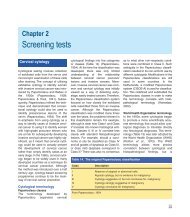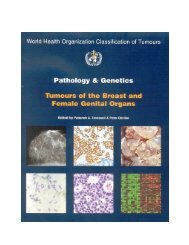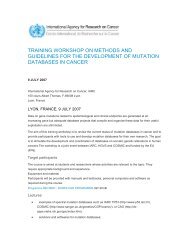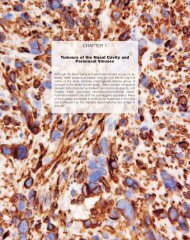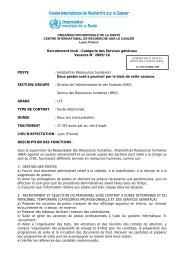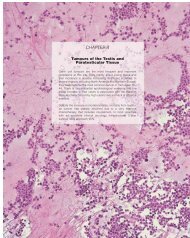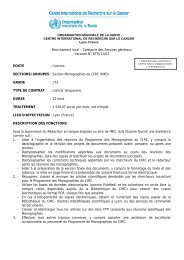world cancer report - iarc
world cancer report - iarc
world cancer report - iarc
You also want an ePaper? Increase the reach of your titles
YUMPU automatically turns print PDFs into web optimized ePapers that Google loves.
,<br />
CANCER CONTROL IN A RURAL<br />
DISTRICT IN WESTERN INDIA<br />
The Tata Memorial Centre, Mumbai, India,<br />
is the apex body for <strong>cancer</strong> control in<br />
Western India and one of the major<br />
Comprehensive Cancer Centres in India. It<br />
has encouraged the initiative of a voluntary<br />
body called Ashwini Rural Cancer<br />
Research and Relief Society in <strong>cancer</strong> control<br />
in an industrially and educationally<br />
backward rural region of western India.<br />
The Society wished to organize a rural<br />
Comprehensive Cancer Centre in Barshi<br />
town in Solapur District, Maharashtra, to<br />
provide multidisciplinary services encompassing<br />
<strong>cancer</strong> prevention, early detection,<br />
treatment, pain relief and continuing<br />
care to the rural poor as well as to conduct<br />
community-oriented <strong>cancer</strong> control<br />
research. Thus the Nargis Dutt Memorial<br />
Cancer Hospital was set up in 1982. The<br />
Tata Memorial Centre, under the aegis of<br />
its rural <strong>cancer</strong> extension project, provided<br />
continuing technical assistance to<br />
organize and develop the clinical and community<br />
extension services of this hospital.<br />
A basic <strong>cancer</strong> surgical facility with an<br />
outpatient clinic and an operating theatre<br />
was first organized while the Tata<br />
Memorial Centre trained two surgeons in<br />
the principles and practice of surgical<br />
oncology, as well as other medical and<br />
paramedical personnel. A health education<br />
programme was initiated in the rural<br />
districts surrounding the hospital to create<br />
<strong>cancer</strong> awareness. Soon a histopathology<br />
and a cytology laboratory were established<br />
followed by endoscopy and radiological<br />
facilities. Ultrasound equipment<br />
was added in 1987. Thus basic diagnostic<br />
and surgical facilities were organized initially<br />
along with community awareness<br />
programmes.<br />
A population-based <strong>cancer</strong> registry to<br />
monitor <strong>cancer</strong> incidence in part of the<br />
rural district (Barshi, Paranda, Bhum<br />
Tehsils) served by the hospital was established<br />
in 1987 with assistance from the<br />
Indian Council of Medical Research. This<br />
316 Cancer control<br />
started providing reliable <strong>cancer</strong> incidence<br />
data from rural India for the first time. The<br />
results from the registry revealed that cervical<br />
<strong>cancer</strong> was responsible for half of the<br />
<strong>cancer</strong> burden in women. Meanwhile the<br />
<strong>cancer</strong> awareness efforts culminated in an<br />
increasing proportion of women with cervical<br />
<strong>cancer</strong>s diagnosed in earlier clinical<br />
stages as years passed.<br />
A radiotherapy facility with a Theratron<br />
Phoenix telecobalt unit, brachytherapy<br />
equipment, a treatment planning system<br />
and a radiation physics laboratory was initiated<br />
in 1992 with assistance from Ratan<br />
Tata Trust in Mumbai. A committed medical<br />
oncology service was inaugurated in 1995.<br />
A CT scanner was added in 1999. The technical<br />
staff for these facilities were trained<br />
by the Tata Memorial Centre.<br />
The Nargis Dutt Hospital initiated a non-randomized<br />
controlled intervention study in<br />
1995 to evaluate the outcome of focused<br />
health education on the early detection of<br />
uterine cervical <strong>cancer</strong>, in collaboration<br />
with IARC. This initiative, now in its sixth<br />
year, has resulted in early detection and<br />
increased survival, followed by a non-significant<br />
reduction in death from cervical <strong>cancer</strong><br />
in the district receiving health education<br />
as compared to the control district.<br />
The Hospital has now grown into a<br />
Comprehensive Cancer Centre with 80 inpatient<br />
beds and a patient dormitory, catering<br />
for the <strong>cancer</strong> care needs of approximately<br />
8 million people living in the surrounding<br />
districts of Solapur, Osmanabad,<br />
Latur, Ahmed Nagar, Beed and Aurangabad<br />
in Maharashtra state, Western India. The<br />
institution is headed by a chairman and is<br />
staffed by two surgical oncologists, a radiation<br />
oncologist, a physician, two anaesthetists,<br />
a pathologist, three resident medical<br />
officers, an epidemiologist, two pathology/cytology<br />
technicians, three laboratory<br />
technicians, a physicist, three radiographers,<br />
twelve oncology nurses and some<br />
health workers. Around 1,400 new <strong>cancer</strong><br />
patients are registered annually, and around<br />
6,000 follow-up visits are carried out. The<br />
Fig. 7.11 The Nargis Dutt Memorial Cancer Hospital,<br />
Barshi.<br />
laboratories process around 1,700 specimens<br />
for histology, and around 4,000 radiological<br />
imaging procedures are carried<br />
out annually. Around 400 major and 550<br />
minor <strong>cancer</strong> surgical procedures and<br />
around 400 endoscopic procedures are<br />
carried out annually. Around 700 patients<br />
receive radiotherapy and 500 receive<br />
some form of chemotherapy.<br />
In 1999, the Nargis Dutt Hospital initiated<br />
a randomized intervention trial involving<br />
160,000 women to evaluate the comparative<br />
efficacy and cost-effectiveness of cervical<br />
screening approaches such as visual<br />
inspection with acetic acid, low intensity<br />
cervical cytology, and HPV testing in cervical<br />
<strong>cancer</strong> prevention in collaboration<br />
with the Tata Memorial Centre and IARC.<br />
The Nargis Dutt Hospital has grown into a<br />
major community <strong>cancer</strong> centre providing<br />
comprehensive <strong>cancer</strong> control services,<br />
encompassing detection, treatment and<br />
prevention services, to a large rural population<br />
in Central India. The programmes<br />
are financially sustained by the revenue<br />
generated by the Hospital, non-recurring<br />
government grants, research grants and<br />
voluntary donations. Services are provided<br />
free of charge or subsidized for approximately<br />
half of the registered patients.<br />
The rural <strong>cancer</strong> control model developed<br />
by the Tata Memorial Centre and the<br />
Nargis Dutt Hospital is ideal for replication<br />
in many low resource settings.





